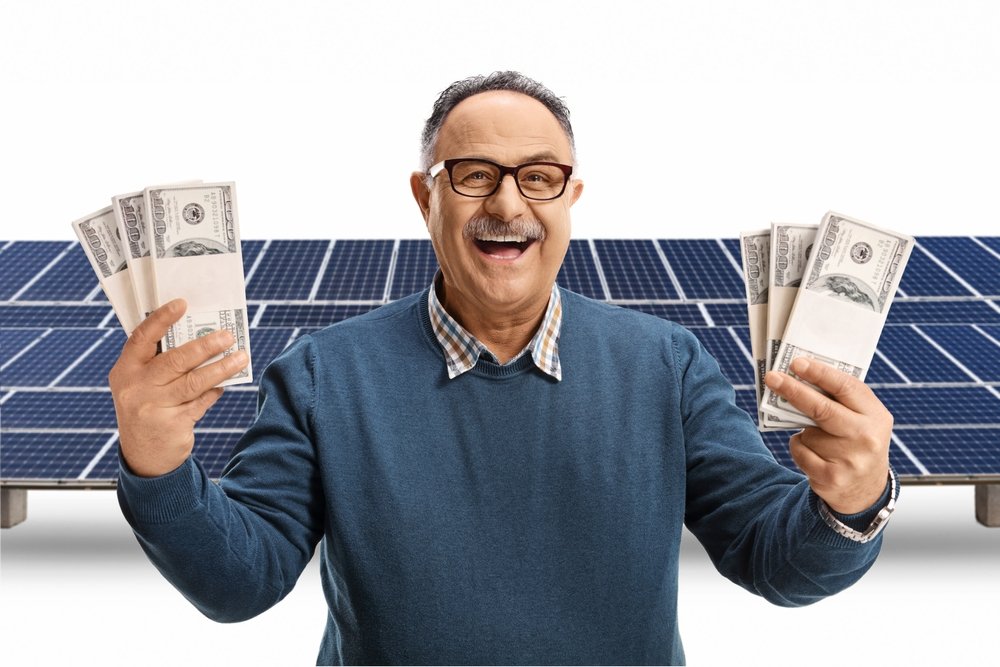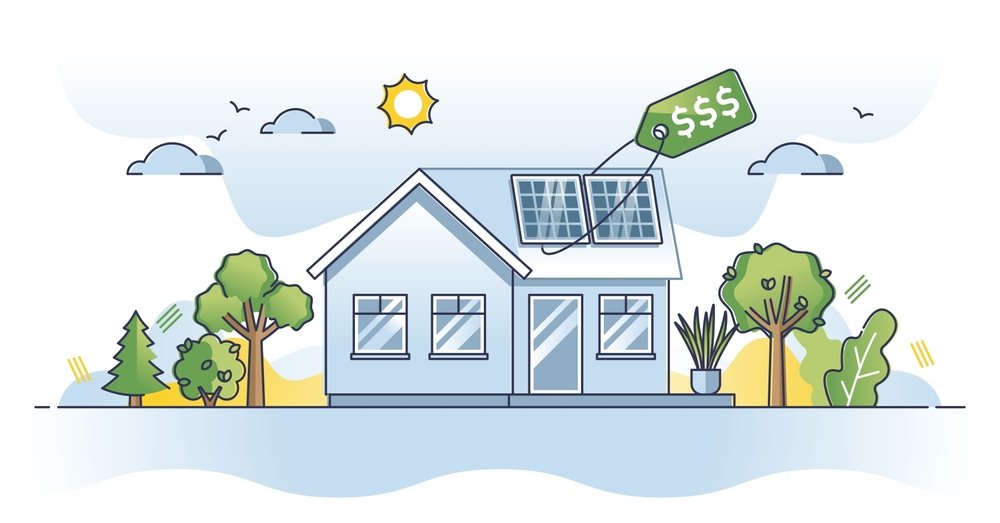Undoubtedly solar Panels can be your best retirement investment. Naturally, as we are approaching retirement, we tend to start finding many investment options, to secure our future. So, the traditional methods that come to our mind are investing in stocks and real estate. Solar Panel investment is not just about leading a greener life, also you can leverage many financial benefits that come along.
One of the best examples is of 40-year-old experienced NASA scientist Lenny Pfister, at the age of 72 installed a solar system in his home, saying that rising electricity prices had pushed him to do so.

Let us explore why investing in solar is a better option and worthy for senior citizens. Also let us discuss the various benefits to consider, which include — Lower Electricity Bills, an increase in the value of your property, a Source of Income, and protection against the increase in electricity. Also, you will find out why solar Investments aren’t taxable by making a comparison of upfront buying vs financing.
Reasons Why Are Solar Panels a Good Retirement Investment Option?
Solar provides stable and increasing returns in many ways as it is a smart financial investment for homeowners. With the increasing electricity rates of 2.5% every year, without solar panels, an average homeowner could pay more than $50,000 in electricity bills. Therefore, by going solar at an average cost of $24,000, you will be able to save more than $45,000 during that same period.
Also, going solar will protect you against future fluctuating electricity prices. Even if your utility bills rise, your consumption cost will seem to be stable with solar. Hence, it can be a great peace of mind for retirees who are living on a certain fixed income.
Benefits of Going Solar for Retirees
Retirees can take advantage of a few great benefits by opting for solar energy:
- Gaining Financial Freedom: Going solar reduces and eliminates electricity bills. For instance, senior or old age people who have been paying about $100 monthly electricity bills can greatly save around $1,200 a year, that money can be used for other essential expenses.
- Increased Home or Property Value: Solar panels help increase your home’s value, as many buyers find the energy-efficient features appealing. Also, a solar-powered property always tends to stand out in the market.
- Environmental and Social Responsibility: By opting for solar power, one could reduce greenhouse gas emissions, contributing to a cleaner and greener environment.
- Tax Reduction and Relief: Solar panels come with favourable tax incentives, making them a very beneficial and attractive investment option for retirees.
Therefore, going solar is not only a financially smart move, but also you are securing your future energy needs, increasing the value of your home and leaving a great legacy for future generations.
Lower Electricity Bills
There is a common question that probably comes to mind for everyone who is planning to install a solar panel system: “Will I still have an electricity bill after going solar?”.
Installing solar panels can lower your electricity bills and help save money. It works by converting naturally available sunlight into electricity through photovoltaic cells to capture the energy from the sun. Further, a solar inverter converts the sunlight into usable alternating current for home use.
Solar systems help reduce electricity bills without having you compromise on your energy usage. Also, it turns out to be the best long-term and low-risk investment.
Yet another important advantage of investing in solar systems is the Net Metering Credits. After you have installed solar systems, your utility bills might not add any charges, and they will just simply indicate how your energy usage was compensated by net metering credits for the month. Hence, the unused bill credits will roll over to the next month such that it lowers your average monthly electric bill charges.
Even if you have solar systems installed, you might still receive an electricity bill if you are connected to the grid. It is because if your solar panels are not producing enough electricity as you require, you might feel like using the electricity from the grid. In such a case, you might have to pay a minimal amount for the grid electricity.
It means that unless your home is completely off the grid (which is a rare and expensive option), you will receive your electricity bill every month.
Increase in the value of your property
According to the studies, investing in solar panels can greatly influence the increase in the resale value of homeowner’s property.
In 2008, a study was published in The Appraisal Journal, stating that using solar panels, for every $1 reduction in yearly utility bills, homes have seen increasing value of $24. By this, we could say that solar systems nearly save around $500 per year, increasing your home value by $10,000. Therefore, due to this, the sellers increase their asking price.
A study from the Berkeley Lab indicated that many homes have seen their resale values increase by $5,900 for each kilowatt (kW) solar panel installed. However, Large systems tend to provide more value as they minimize the electricity costs.
In 2018, Zillow housing survey analysis showed the list of homes that were sold within the period — March 2018 to February 2019, where solar-powered homes were sold for 4.1% higher cost than non-solar-powered homes. For example, if a home valued at $240,000 had a boost of $9,600.
Generate a Source of Income
After retirement, a person can get a standard income from solar in many ways, which includes — SREC, Net Metering, and other performance-based programs.
SREC (Solar Renewable Energy Certificates) are solar incentives offered based on performance, which allows you to earn extra income from the electricity generated through solar systems. Homeowners can earn 1 SREC for every MWh of generated electricity from their solar panels. Also, these SRECs are very valuable as every year most of the utilities have to purchase a certain number of them to meet the long-term sustainability requirements, which are set by the RPS (Renewable Portfolio Standard).
Net metering makes it possible for you to earn rebates and credits for the excess produced solar energy, you get paid a second time for the solar generation.
Hence, this is a system of credits and debits, which helps reduce bills depending on the difference between the amount of energy produced by solar panels and the amount of energy consumed. Therefore, net metering is not earning income from solar panels, but it indeed helps you to manage and compensate some amount of money in your utility bills.
Other performance-based programs might keep varying by different states and utility companies, providing greater scope for you to earn extra income from solar energy production. However, these programs might include state-based incentives and initiatives that are meant to encourage solar system owners by rewarding them for their contribution to renewable energy generation.
Protection Against Rising Prices of Electricity
To protect against the rising prices of electricity, Here are a few important factors to consider which can help you minimize the impact of increasing electricity costs.
1. Understanding the Factors Resulting in Price Increases
In the United States, factors that led to the rising prices of electricity include fuel cost (like natural gas) which plays a major role in fluctuating electricity prices. On top of that, electricity costs are influenced by investments in infrastructure, transmission systems, and other regulatory policies.
2. Energy Utilization and Conservation
Electricity consumption can be reduced, and electricity bills can be lowered by simply implementing perfect energy-efficient practices and investing in energy-saving appliances. However, the United States Department of Energy (DOE) is providing enough resources and programs to improve energy efficiency. Also, it includes certified energy-efficient products with guidance on energy-saving methodologies.
3. Transition to Renewable Energy
Solar and Wind power can be the best transition to renewable energy sources, which are indeed a long-term approach to reduce the impact of rising electricity prices. However, these renewable energies are constantly receiving support from the U.S. government through many initiatives, such as — tax incentives, research, and development programs.
4. Consumer Knowledge and Awareness
The consumer needs to have the right knowledge and awareness about the tools to monitor and manage their electricity consumption. Nowadays, most utility companies have been offering tools and resources for consumers to easily track their consumption metrics.
5. Regulatory Approaches and Policy Advocacy
It is essential to engage in policy advocacy that strengthens consumer protection, adoption of renewable energy, and implementing measures to reduce electricity prices. This includes understanding the framework and supporting user-friendly policies at local, state, and federal levels.
Solar Investments Aren’t Taxable
According to the United States, solar investments aren’t taxable as they offer a few tax benefits and incentives, making them more beneficial compared to traditional investments. Here is a more in-depth comparison:
| SOLAR INVESTMENT | TRADITIONAL INVESTMENT |
| Eligible for a federal tax credit.
Individuals can claim a credit against their federal income tax or alternative minimum tax. |
Does not offer any specific tax credits or incentives. |
| Offers Depreciation Benefits.
Investors can claim a tax deduction for the wear and tear of assets over time, saving money on taxes. |
Does not possess any sort of Depreciation benefits associated with their assets. |
| Qualifies for state-level incentives.
The SREC (Solar Renewable Energy Certificates) and local utility rebates provide financial benefits. SRECs are considered taxable income |
Does not have access to state-level incentives |
| Best Long-term Investment.
It is designed to improve a company’s or individual’s financial health. |
It comes under the capital expenditures category and doesn’t offer specific benefits as a solar investment. |
Solar Panels: Buying vs Financing

Buying Solar Panels Upfront
Including the equipment and installation, buying a solar panel upfront entails making a one-time payment for the whole cost of the solar panel system. The upfront payment usually includes — solar panels, an inverter, mounting hardware, and other required equipment for proper system functioning.
- Buying solar panels will require a large initial expense, which ranges from $15,000 to $33,000 based on the system size and installation cost.
- However, buying solar panels will lead to great long-term savings by reducing your electricity bills from 70% to 100% and paying for themselves in 4 to 6 years.
- If you need financing, then opting for a home equity loan or home equity line of credit will be the best cost-effective method, as it has low interest rates and tax-deductible interest payments.
The process of buying a solar panel upfront consists of several steps:
- Understanding the system size and desired panel type, which influence the overall cost.
- Calculating the cost of the solar power system.
- Considering energy-producing capabilities.
- Measuring the time for upfront investments to pay for itself through saved energy costs.
- A professional installer must install solar panel systems.
NOTE: You need to know that after 12 years, the solar PV inverter might need replacement. Also, checking and performing regular maintenance is recommended to make sure of the system’s proper working.
Benefits of buying a solar panel upfront:
- Great savings ability for long-term cost on energy bills.
- Homeowners or Business owners can avoid monthly lease or loan payments.
- Various financial incentives like — tax credits and rebates.
- Flexibility in making decisions on maintenance and repairs, and increasing the property’s value.
- Solar panels lend a hand to environmental sustainability, reducing our dependence on traditional energy sources and thereby decreasing carbon emissions.
Financing Solar Panels
There are different ways to finance solar panels, including cash payments, personal loans, home equity financing, government loan programs, solar leases, PPAs (Power Purchase Agreements), and solar loans. However, each of these options has different advantages to consider.
- A beneficial factor of Financing is that you can make immediate solar panel installation without a huge upfront payment. Also, your electricity bill savings can cover the loan payment expenses.
- Important factors to consider include — overall interest costs, monthly payments, tax incentives, repayment terms, and eligibility for low annual percentage rates.
Solar loans are unsecured financing, which means either your home or the solar panels are not part of the collateral for the loan. However, the loan amounts usually range between $1,000 to $100,000, with 2 to 7 years of repayment terms.
Zero Down Payment solar loan, allows you to install panels and start using them right away to power your home (without having to pay an initial down payment).
PPAs (Power Purchase Agreements) and Solar leases are generally long-term agreements negotiated between a solar service provider and the homeowner.
- Solar Lease: You will be paying a fixed monthly amount for using solar panels and other solar equipment.
- PPA: You will be paying a monthly amount for the electricity produced by the solar panels.
However, both these options don’t require upfront costs, but solar leases and PPAs are more profitable for the service provider compared to a homeowner. It is because you are not going to own the solar panel system in a lease/PPA setup. Hence, you will not be eligible to receive any sort of financial incentives or rebates that come with solar (But the company owning the system will be eligible for this).
Are solar panels worth it for seniors?
Yes, Solar Panels are worth it for seniors as they could be the best investment and the majority of the United States population aged 65 or more have a positive view of solar energy. This is because they are willing to save electricity costs, avoid electricity price hikes, and benefit from government incentives. Moreover, the Federal solar investment provides a 26% tax credit for solar panels that are being installed on residential properties.
Seniors who are interested in going solar must get in touch with well-established and authorized solar companies which are capable of offering many financing options like — zero-down solar loans, solar leases, and PPAs (power purchase agreements).
Usually, seniors might be concerned about the suitability of their homes due to factors such as — age, tree shading, roof space, shape, and slope of their roofs. For that, they can consult with solar providers, who can help them with the technical feasibility of solar panel installation.
Ray is an avid reader and writer with over 25 years of experience serving various domestic and multinational private and public energy companies in the USA.

